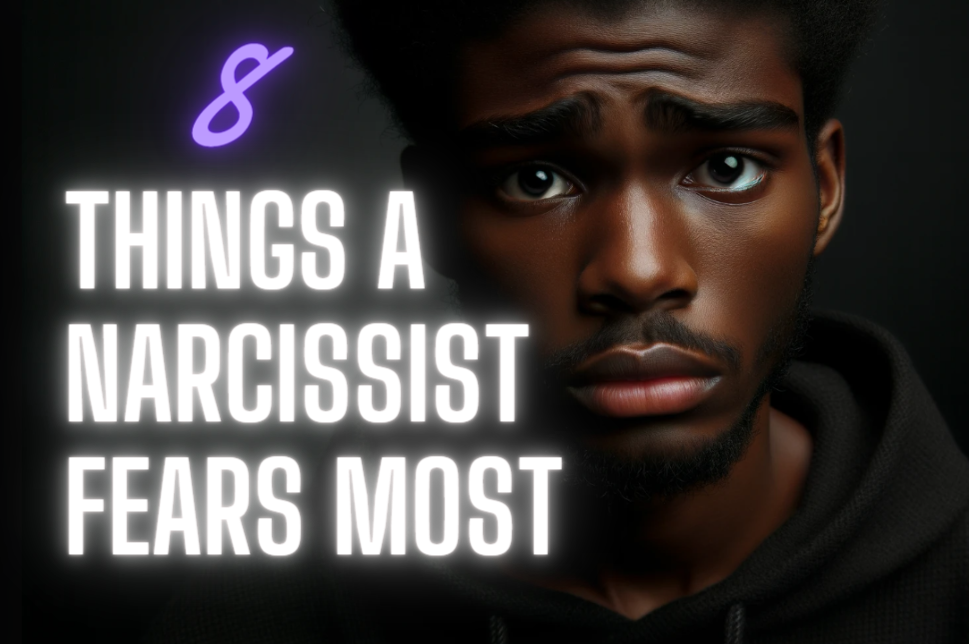
Introduction
Narcissism, it’s a word that’s tossed around quite a bit these days. But what does it really mean? At its core, narcissism refers to a grandiose sense of self-importance, a need for excessive admiration, and a lack of empathy for others. People with this trait often appear overly confident or self-absorbed. Yet, beneath the surface, there can be a whole lot more going on.
This isn’t just about people who love taking selfies or talking about themselves. It’s about a complex personality trait that can impact relationships and everyday interactions in profound ways. Understanding narcissism means delving into these complexities and recognizing that there’s more than meets the eye.
The subject of this piece? The things that narcissists are secretly afraid of. While they may exude confidence, there’s often a whole host of fears hiding beneath the surface. This article will explore eight of those fears, shedding some light on what’s really going on behind that seemingly impenetrable facade.
What the narcissist fears most…
Fear of Exposure
Everybody’s got something they’d rather keep under wraps, right? For narcissists, that something might be the fear of being seen as imperfect or flawed. This isn’t just a passing worry; it can become an all-consuming dread.
Imagine living life under a spotlight, always concerned that someone might catch a glimpse of the real you. Narcissists often construct a perfect image of themselves, something they think the world wants to see. But the real person behind that image? They might be riddled with self-doubt, insecurities, and anxieties.
The fear of exposure isn’t just about looking bad in front of others. It’s about the potential unraveling of an entire self-image, a foundation that they’ve spent years carefully crafting. If someone pulls at the threads of that image, the whole thing might come tumbling down.
Real-life examples or case studies can add depth to this understanding. Professionals in the field have seen firsthand the toll this fear can take on individuals with narcissistic traits. The fear of exposure isn’t just a quirky characteristic; it’s a fundamental aspect of the narcissistic personality that can drive behavior in surprising and sometimes alarming ways.
Fear of Rejection
Rejection stings, doesn’t it? But for a narcissist, that sting can feel more like a punch to the gut. Remember, we’re talking about folks who’ve built an image around being exceptional, admired, and sought after. A rejection, whether in love, work, or even a casual social setting, can feel like a direct assault on that self-crafted image.
It’s not just about losing face or feeling left out. For a narcissist, rejection can be a haunting reminder of their deepest insecurities. It’s like a mirror reflecting back at them something they’ve tried so hard to hide: that they might not be as perfect as they want the world to believe.
This fear of rejection doesn’t just pop up out of nowhere. It’s often rooted in past experiences and shaped by underlying emotional issues. It can affect how a narcissist approaches relationships, jobs, and even simple social interactions.
The twist here is that the very behaviors that might lead to rejection, such as arrogance or a lack of empathy, are part and parcel of the narcissistic personality. It’s a complex, often self-fulfilling prophecy, where the fear of rejection drives behaviors that, in turn, might lead to more rejection.
Understanding this fear is key to comprehending the way a narcissist’s mind works. It’s not about vanity or a simple need for attention; it’s about a profound and often painful struggle with self-image and self-worth.
Fear of Losing Control
Control is a big deal for a lot of people, but for a narcissist, it’s like oxygen. It’s how they navigate their world and keep everything in check. Losing control? That’s not just an inconvenience; it’s a nightmare scenario.
Imagine steering a ship through stormy seas, and suddenly the wheel slips from your grasp. For a narcissist, losing control over situations, relationships, or their image can feel just as chaotic and terrifying.
This need for control is often linked to a deep-seated anxiety about letting others see behind the curtain. If they lose control, others might see their vulnerabilities, their imperfections, and their fears.
At work, it might manifest as micromanaging. In relationships, it could show up as an overpowering need to dictate terms. The underlying theme is a terror of letting go and allowing things to unfold naturally.
The paradox here is that this very need for control can become controlling of the narcissist themselves. It’s a trap that can lead to strained relationships and a life ruled by fear and anxiety.
Understanding the fear of losing control in narcissists isn’t about condemning or judging. It’s about recognizing the psychological mechanisms at play and appreciating how they influence behavior. It’s a complex fear, tied to the very core of the narcissistic personality, and one that can both drive and hinder their lives in powerful ways.
Fear of Emptiness
Ever been in a room full of people and still felt totally alone? Now, imagine feeling that way most of the time. For some narcissists, that’s what’s lurking beneath all that swagger and self-assurance: a nagging, persistent fear of emptiness.
It’s like having a beautiful vase that’s always empty inside. On the surface, everything seems polished and perfect, but inside there’s a void, a sense of lacking something essential.
This fear isn’t about being physically alone. It’s about an inner emptiness, a feeling that something fundamental is missing. And no amount of praise, success, or external validation can fill that void.
What makes this fear particularly poignant is that the narcissist might not even fully recognize it themselves. It’s a shadowy, elusive fear that can drive them to seek out more and more validation, all the while never feeling truly fulfilled.
In relationships, it might lead to a never-ending quest for attention. In careers, it might translate to an insatiable drive for success. But the underlying emptiness remains, often just out of reach and understanding.
The fear of emptiness is one of the more philosophical and existential fears associated with narcissism. It’s a profound aspect of the human condition that can take on unique and often painful dimensions within the narcissistic personality. Understanding it requires empathy, insight, and a willingness to look beyond the surface to what’s really going on inside.
Fear of Dependence
Here’s a twist on the narcissist’s playbook: a fear of dependence. Sounds a bit counterintuitive, right? After all, we’re talking about people who seem to thrive on admiration and attention from others. But scratch the surface, and you’ll find a complicated relationship with depending on others.
It’s a bit like wanting to have your cake and eat it too. Narcissists may crave attention, but the idea of actually relying on others for emotional or physical support? That’s a no-go. Dependence clashes with the image of strength, self-sufficiency, and superiority that many narcissists cultivate.
This fear can make intimate relationships especially challenging. Trusting someone enough to depend on them means letting your guard down, revealing your vulnerabilities. And for a narcissist, that can feel like a threat to their very sense of self.
At work, the fear of dependence might manifest as an inability to delegate or trust colleagues. In friendships, it might lead to shallow connections, where real trust never develops.
The paradox here is the dependence on others for admiration and validation, juxtaposed with a fear of depending on others in more substantial, meaningful ways. It’s a complex dance, one that can leave both the narcissist and those around them feeling confused and frustrated.
Understanding the fear of dependence in narcissism is like untangling a knot. It’s a multifaceted fear, interwoven with other aspects of the narcissistic personality, and one that can deeply influence how they navigate their world. It’s not a straightforward fear, but one that adds a rich and often challenging layer to the complex tapestry of narcissism.
Fear of Intimacy
Intimacy is a tricky thing for many people, but for narcissists, it can be downright terrifying. Think of it this way: intimacy requires vulnerability, and vulnerability can feel like kryptonite to someone who’s built an image around being invincible.
But let’s dive a bit deeper. Intimacy isn’t just about romantic relationships. It’s about genuine connections, opening up, sharing your true self with others. For a narcissist, this can feel like opening Pandora’s box. What if others see the real them and reject it? What if they lose control over how others perceive them?
This fear can play out in various ways. In romantic relationships, it might lead to a pattern of superficial connections, avoiding real commitment. In friendships, it might result in a lack of depth, never really letting others in.
The twist here is that while fearing intimacy, a narcissist might also long for it. They may recognize, on some level, that their relationships lack depth and meaning. But the fear of what intimacy requires – vulnerability, authenticity, letting go of control – holds them back.
Understanding the fear of intimacy in narcissism is like looking through a two-way mirror. On one side, there’s the image they present to the world; on the other, there’s the hidden longing for something deeper and more genuine. It’s a poignant and often painful fear, one that can shape their relationships and their lives in profound ways. It’s a fear that reminds us that behind the façade, there’s often a human being longing for connection, even if they don’t quite know how to achieve it.
Fear of Aging or Illness
Nobody likes getting older or facing the possibility of sickness, but for a narcissist, these natural aspects of life can feel like a personal affront. It’s like a crack appearing in a carefully crafted statue, a blemish on a perfect façade.
See, a narcissist’s self-worth is often tied to their physical appearance, strength, or prowess. Aging or illness threatens those qualities, and with them, the narcissist’s carefully constructed self-image.
This fear can lead to an obsession with physical appearance, a relentless pursuit of youthfulness, or an exaggerated fear of illness. It’s not just about vanity; it’s about maintaining control over how they’re perceived, keeping the image intact.
In professional life, it might manifest as a fear of becoming obsolete or being replaced by younger, more vibrant competitors. In personal life, it might lead to a relentless focus on fitness, appearance, or health.
What makes this fear so poignant is its inevitability. No matter how hard they try, no one can escape aging or the potential for illness. It’s a battle that can’t be won, yet the fear of losing it can dominate a narcissist’s life.
Understanding the fear of aging or illness in narcissism requires recognizing the profound link between self-image and physicality. It’s a fear that’s grounded in our culture’s obsession with youth and vitality, but it takes on unique and often painful dimensions within the narcissistic personality. It’s a fear that underscores the fragile nature of a self-image built on something as transient as physical appearance. It’s a fear that, in many ways, reflects a universal human struggle, but one that’s magnified and distorted through the lens of narcissism.
Fear of Failure
Failure’s tough for anyone, but for a narcissist, it’s like an earthquake to their foundation. Their whole identity might be built around being successful, competent, and winning. So what happens when they don’t?
This fear of failure isn’t just about losing a game or missing a promotion. It’s about something much deeper. It’s about a threat to their very sense of self, a crack in the armor they’ve meticulously crafted.
At work, this fear might lead to excessive risk-avoidance or, conversely, taking on too much to prove they can handle it. In personal life, it might mean never trying anything where they might not excel, missing out on growth and experiences.
The twist here is that this fear of failure can lead to a self-fulfilling prophecy. By avoiding challenges or pushing too hard, they might actually increase the chances of failure.
Understanding the fear of failure in narcissism means recognizing how tightly success is tied to their self-image. It’s not just about ego or pride; it’s about an existential threat to who they believe they are.
The fear of failure in narcissism is a complex and often contradictory fear. It’s a fear that drives them but can also hold them back. It’s a fear that can lead to both remarkable achievements and profound limitations. It’s a fear that’s as human as it gets, but one that takes on unique and often challenging dimensions within the narcissistic personality. It’s a fear that reminds us that behind the bravado and self-assurance, there’s often a person struggling with the same doubts and insecurities that many of us face, but magnified and intensified by the nature of their personality.
Conclusion
So there we have it, a journey into the fears that often lurk behind the narcissistic façade. From the fear of exposure to rejection, from the terror of losing control to the existential dread of emptiness, aging, or failure, these fears paint a complex and nuanced picture.
They remind us that narcissism isn’t just about arrogance or a lack of empathy. It’s about a human being, often struggling with profound and sometimes paradoxical fears. Understanding these fears isn’t just an intellectual exercise; it’s a path to empathy, to a deeper comprehension of what drives behavior, what shapes relationships, and what it means to navigate the world with this particular set of challenges.
This exploration sheds light on the human dimension of narcissism, a dimension often overshadowed by stereotypes and judgments. It invites us to look beyond the surface, to recognize the fears that may influence actions, and to approach the subject with curiosity, empathy, and a willingness to understand.
Whether it’s in professional settings, personal relationships, or a more global societal context, recognizing these fears offers an opportunity for more effective communication, support, and perhaps even growth. It’s a reminder that beneath the labels and the categories, there’s a complex and often conflicted human being, one deserving of insight, compassion, and thoughtful consideration.




